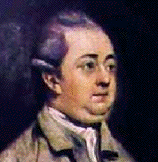May 8: Edward Gibbon
Edward Gibbon (1737)
It was on this date, May 8, 1737, that English historian and MP Edward Gibbon was born near London. He was educated at Oxford where, he said later, he spent "the most idle and unprofitable" fourteen months of his life. He was recalled by his father for converting to Roman Catholicism, and returned to the Church of England after his father sent him to Lausanne, Switzerland, in 1753, with a Calvinist as his guardian. But his religion shifted yet again, perhaps after meeting Voltaire: Samuel Johnson described Gibbon as one of the "infidel wasps" before he reached age 40.
It was at Rome, wrote Gibbon, "[o]n the fifteenth of October 1764, as I sat musing amidst the ruins of the Capitol, while the bare-footed friars were singing Vespers in the Temple of Jupiter, the idea of writing the decline and fall of the city first started to my mind." His father died in 1770, leaving Gibbon enough money to begin writing in London. The first volume of his masterwork, The History of the Decline and Fall of the Roman Empire, appeared in 1776, the last three in 1788 while Gibbon lived once again in Switzerland. The seven-volume edition revised and annotated by J.B. Bury (1861-1927) is considered the greatest historical work written in English.
Aiming to elevate history above "the register of the crimes, follies and misfortunes of mankind," Gibbon wrested the study of the past from clerical confines and outraged the divines of the time by describing Christianity as a factor that hastened the decay of Rome. Gibbon wrote, "... the church and even the state were distracted by religious factions, whose conflicts were sometimes bloody and always implacable; the attention of the emperors was diverted from camps to synods; the Roman world was oppressed by a new species of tyranny, and the persecuted sects became the secret enemies of their country."
In the Roman world, Gibbon wrote, Athenian wisdom had been supplanted by "the establishment of a new religion, whose ministers superseded the exercise of reason, resolved every question by an article of faith, and condemned the infidel or skeptic to eternal flames." Steadfastly resisting the treatment of religion as anything more than a social force, Gibbon also wrote, "The various modes of worship which prevailed in the Roman world were all considered by the people as equally true; by the philosopher as equally false; and by the magistrate as equally useful."
Sir Leslie Stephen, in the Dictionary of National Biography, said of Gibbon's work, "in accuracy, thoroughness, lucidity and comprehensive grasp of a vast subject the History is unsurpassable." Although Gibbon is accused (mostly by those who have not read him) of Atheism and of bias against religion, because of his unbelief, in his famous chapters 15 and 16 he is more charitable toward Christianity than it deserves. This may have been tactical irony: blasphemy was still prosecuted in England at the time.
Perhaps the highest compliment was paid by John Henry Newman, the Catholic convert and cardinal, who wrote, "It is melancholy to say it, but the chief, perhaps the only English writer who has any claim to be an ecclesiastical historian, is the unbeliever Gibbon."
Originally published May 2003 by Ronald Bruce Meyer.


